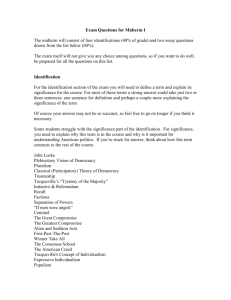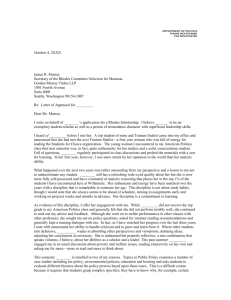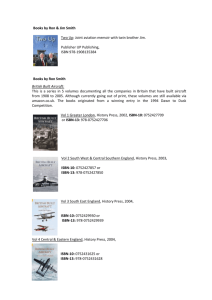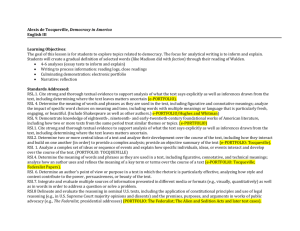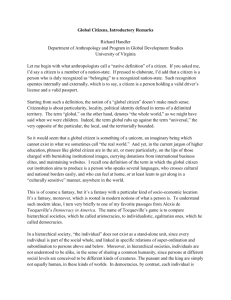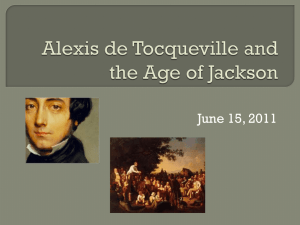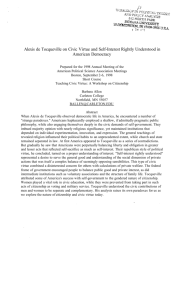Humanities 401W - College of Liberal Arts
advertisement
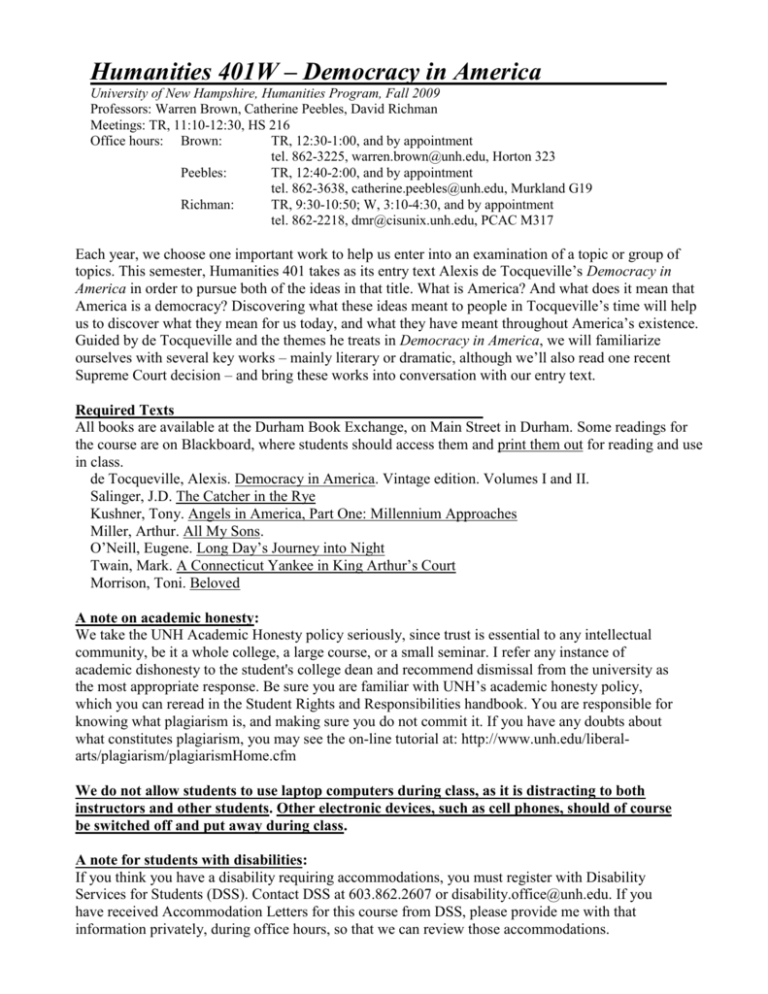
Humanities 401W – Democracy in America__________ University of New Hampshire, Humanities Program, Fall 2009 Professors: Warren Brown, Catherine Peebles, David Richman Meetings: TR, 11:10-12:30, HS 216 Office hours: Brown: TR, 12:30-1:00, and by appointment tel. 862-3225, warren.brown@unh.edu, Horton 323 Peebles: TR, 12:40-2:00, and by appointment tel. 862-3638, catherine.peebles@unh.edu, Murkland G19 Richman: TR, 9:30-10:50; W, 3:10-4:30, and by appointment tel. 862-2218, dmr@cisunix.unh.edu, PCAC M317 Each year, we choose one important work to help us enter into an examination of a topic or group of topics. This semester, Humanities 401 takes as its entry text Alexis de Tocqueville’s Democracy in America in order to pursue both of the ideas in that title. What is America? And what does it mean that America is a democracy? Discovering what these ideas meant to people in Tocqueville’s time will help us to discover what they mean for us today, and what they have meant throughout America’s existence. Guided by de Tocqueville and the themes he treats in Democracy in America, we will familiarize ourselves with several key works – mainly literary or dramatic, although we’ll also read one recent Supreme Court decision – and bring these works into conversation with our entry text. Required Texts_________________________________________ All books are available at the Durham Book Exchange, on Main Street in Durham. Some readings for the course are on Blackboard, where students should access them and print them out for reading and use in class. de Tocqueville, Alexis. Democracy in America. Vintage edition. Volumes I and II. Salinger, J.D. The Catcher in the Rye Kushner, Tony. Angels in America, Part One: Millennium Approaches Miller, Arthur. All My Sons. O’Neill, Eugene. Long Day’s Journey into Night Twain, Mark. A Connecticut Yankee in King Arthur’s Court Morrison, Toni. Beloved A note on academic honesty: We take the UNH Academic Honesty policy seriously, since trust is essential to any intellectual community, be it a whole college, a large course, or a small seminar. I refer any instance of academic dishonesty to the student's college dean and recommend dismissal from the university as the most appropriate response. Be sure you are familiar with UNH’s academic honesty policy, which you can reread in the Student Rights and Responsibilities handbook. You are responsible for knowing what plagiarism is, and making sure you do not commit it. If you have any doubts about what constitutes plagiarism, you may see the on-line tutorial at: http://www.unh.edu/liberalarts/plagiarism/plagiarismHome.cfm We do not allow students to use laptop computers during class, as it is distracting to both instructors and other students. Other electronic devices, such as cell phones, should of course be switched off and put away during class. A note for students with disabilities: If you think you have a disability requiring accommodations, you must register with Disability Services for Students (DSS). Contact DSS at 603.862.2607 or disability.office@unh.edu. If you have received Accommodation Letters for this course from DSS, please provide me with that information privately, during office hours, so that we can review those accommodations. Course Requirements_____________________________________ Coming to class prepared, having done the assigned reading and made extensive notes on it, and having carefully reviewed lecture notes. This course involves a relatively heavy reading load and students should budget their out-of-class work time accordingly. Students are expected and required to devote a minimum of six to eight hours per week to class preparation. Preparing for this class includes reading and re-reading the assigned work carefully, underlining important passages, making notes in the margins, and making notes in your notebook. Your own notes should range from copying significant sections of a text and definitions of new vocabulary words, to writing down specific questions you have, to formulating critical responses and interpretations. You are required to look up vocabulary words with which you are unfamiliar (the Oxford English Dictionary, available through the Library tab on Blackboard, is the best source). And you are required to bring formulated questions to each class meeting. Your class preparation grade will be based upon your contribution of salient questions and interpretations in class. Class sessions will be a combination of some lecture and some discussion. Attendance is required. A student who misses three classes during the semester will lose a full letter grade for each subsequent absence, and is required to make an appointment and discuss the problem with her/his instructor. There is no distinction between “excused” or “unexcused” absences. The penalty scheme for attendance takes into consideration the occasional emergency or illness. Accordingly, students are allowed three absences with no penalty. After that, each absence lowers the grade by one letter-grade. Papers and Examinations______________________________________ Students will spend much of the semester preparing and writing a seven-page paper. The first assignment related to this paper is the statement, in one page, of a paper topic. This assignment should include a brief statement of the one work on which the student intends to focus, and an identification of the principal passage within that work the student will treat. In addition, the student must provide two examples of thesis statements he or she thinks could likely be his or her main claim in the paper. The next assignment related to the paper is the paper proposal (3 pages), in which the student states the thesis of the paper, and lays out the organization of the argument, noting what pieces of evidence from the text will go to support specific steps in argument. The seven-page paper is due on the last day of class (handed in to your section leader), and should be written in accordance with MLA style. See the library’s Reference website for information on MLA style (www.reference.unh.edu) and/or consult the seventh edition of the MLA Handbook for Writers of Research Papers. In short, this should be a paper in which you make a thesis claim, and support it with a close reading of a passage or passages from the text you are discussing. There will be two examinations. The first examination will be administered in-class, and is shortanswer in format. It is intended to make sure that we are all doing the reading closely and attending well in class. The second exam is a take-home essay exam, which you will turn in to your section leader (section 1: Peebles; section 2: Richman; section 3: Brown). Your final grade will be an average of your class participation, the two examinations, and the three writing assignments, minus any penalty for missed classes (see “attendance” above). Class participation: 20% Exam #1: 15% Exam #2: 20% Paper Topic: Paper proposal: Final paper: 10% 15% 20% Please note: Assignment, dates, and other details in this syllabus may change, depending on our progress as a group. Reading Time-table Each reading should be completed by the day it is first listed. Always bring the assigned reading to class with you. T Aug. 31 R Sept. 2 Course Introduction Tocqueville, Democracy in America, Author’s Introduction, The Origins of Anglo Americans: Volume I, Chapter II T Sept. 7 Tocqueville, Skepticism, Doubt, and Conformity in the American Way of Life: The Philosophic Method of Americans: Volume II, Book I, Chapters I, II Finishing discussion of Tocqueville, Vol. II, Book I, Chapters I, II, and beginning Salinger, The Catcher in the Rye R Sept. 9 T Sept. 14 R Sept. 16 Salinger, The Catcher in the Rye Kushner, Angels in America T Sept. 21 R Sept. 23 Kushner, Angels in America Tocqueville, Individualism, Self-interest, and the Pursuit of Property in America: Volume II, Book II, Chapters I, II, X, XI, XIII T Sept. 28 R Sept. 30 Arthur Miller, All My Sons Arthur Miller, All My Sons T Oct. 5 Tocqueville, Religion and Its Influence in America: Volume I, Chap. XVII, Sub-section: “Indirect Influence of Religious Opinions upon Political Society in the United States,” (pgs. 303-314); Vol. II, Book I, Chapter V; Volume II, Book II, Chapter XV Tocqueville, Religion and Its Influence in America: Volume I, Chap. XVII, Sub-section: “Indirect Influence of Religious Opinions upon Political Society in the United States,” (pgs. 303-314); Vol. II, Book I, Chapter V; Volume II, Book II, Chapter XV R Oct. 7 T Oct. 12 R Oct. 14 Review for exam Exam #1 T Oct. 19 R Oct. 21 Flannery O’Conner, “A Good Man Is Hard to Find” (print from Bb) Supreme Court Case: McCreary County, Kentucky, et al. v. American Civil Liberties Union of Kentucky et al. (print from Bb) T Oct. 26 Tocqueville, The American Family and Its Members: Volume II, Book III, Chapters VIII-XII Tocqueville, The American Family and Its Members: Volume II, Book III, Chapters VIII-XII R Oct. 28 PAPER TOPIC DUE T Nov. 2 R Nov. 4 O’Neill, Long Day’s Journey into Night O’Neill, Long Day’s Journey into Night T Nov. 9 R Nov. 11 Tocqueville, Customs, Manners, Honor, and Ambition in America: Volume II, Book III, Chapters 1-IV, XIV, XVIII, XIX PAPER PROPOSAL DUE NO CLASS (Veteran’s Day) T Nov. 16 R Nov. 18 Twain, A Connecticut Yankee in King Arthur’s Court Twain, A Connecticut Yankee in King Arthur’s Court T Nov. 23 R Nov. 25 Tocqueville, Equality and Race in America: Volume I, Chapter XVIII NO CLASSES (Thanksgiving Holiday) T Nov. 30 R Dec. 2 Tocqueville, Equality and Race in America: Volume I, Chapter XVIII Toni Morrison, Beloved T Dec. 7 R Dec. 9 Toni Morrison, Beloved Tocqeville, What the Future May Hold for America: Volume, II, Book IV, Chapters VI, VII, VIII PAPER DUE. FINAL EXAM HANDED OUT. FINAL EXAM DUE BY NOON ON MONDAY, DECEMBER 13. Reading List with publication information included de Tocqueville, Alexis. Democracy in America. Vintage edition. Volumes I and II. Volume I: Publisher: Vintage (August 11, 1990) ISBN-10: 0679728252 ISBN-13: 978-0679728252 Volume II: Publisher: Vintage (August 11, 1990) ISBN-10: 0679728260 ISBN-13: 978-0679728269 Salinger, J.D. The Catcher in the Rye Mass Market Paperback: 224 pages Publisher: Little, Brown and Company (May 1, 1991) ISBN-10: 0316769487 ISBN-13: 978-0316769488 Kushner, Tony. Angels in America, Part One: Millennium Approaches Publisher: Theatre Communications Group; First Edition edition (May 1, 1993) ISBN-10: 1559360615 ISBN-13: 978-1559360616 Miller, Arthur. All My Sons. Penguin Classics. ISBN: 9780141185460 O’Neill, Eugene. Long Day’s Journey into Night Publisher: Yale University Press; 2nd edition (March 1, 2002) ISBN-10: 0300093055 ISBN-13: 978-0300093056 Twain, Mark. A Connecticut Yankee in King Arthur’s Court Mass Market Paperback: 336 pages Publisher: Bantam Classics (October 1, 1983) ISBN-10: 0553211439 ISBN-13: 978-0553211436 Morrison, Toni. Beloved Paperback: 352 pages Publisher: Vintage (June 8, 2004) ISBN-10: 1400033411 ISBN-13: 978-1400033416
